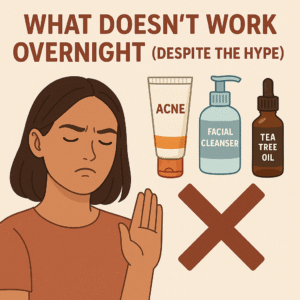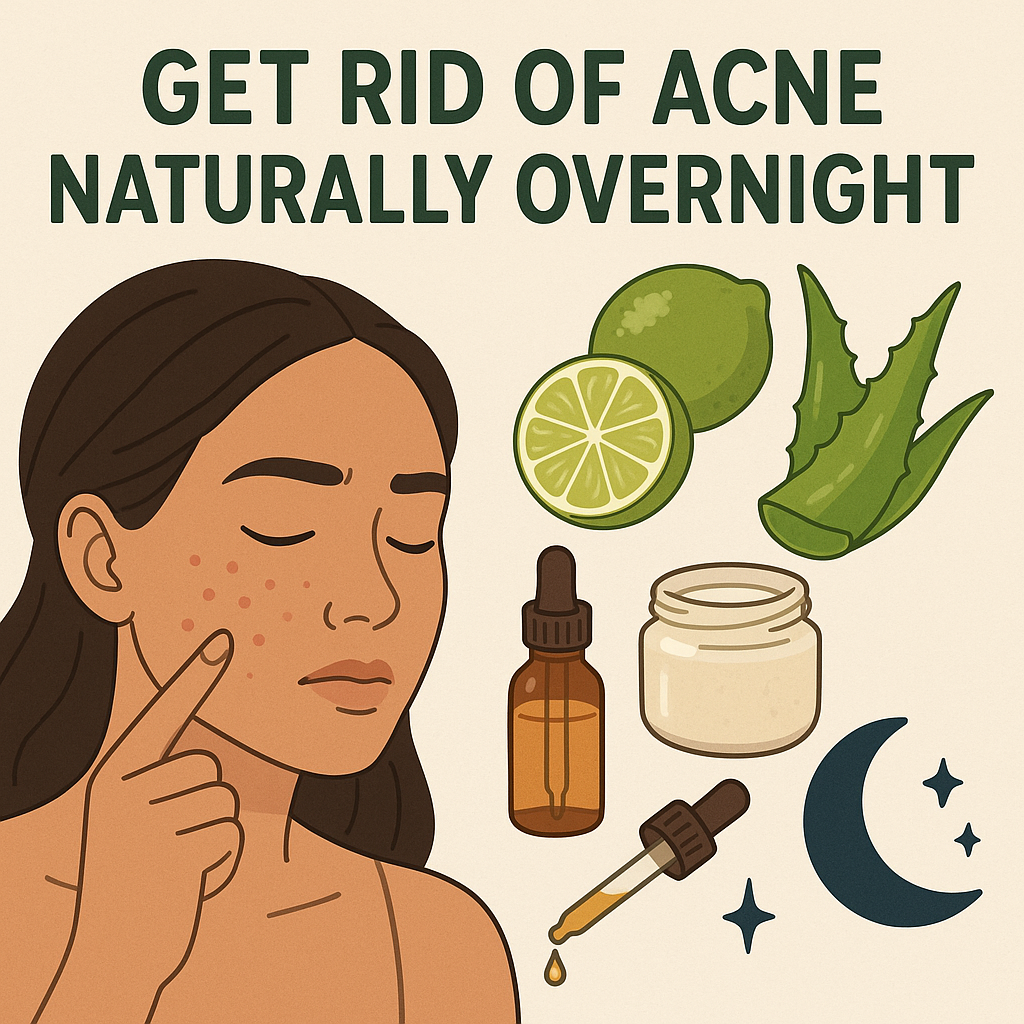Get rid of acne naturally overnight
Acne is a skin condition that affects nearly 85% of people between the ages of 12 and 24, according to the American Academy of Dermatology. Whether it’s a full-blown breakout or the sudden appearance of a single pimple, the desire for an instant solution is universal. But can you get rid of acne overnight? The short answer: it depends.
A Quick Science Lesson
Before we talk about cures, it’s important to understand what acne is and why it appears. Acne occurs when hair follicles become clogged with oil and dead skin cells. Factors that contribute to acne include:
Excess sebum (oil) production
Clogged pores
Bacteria (Cutibacterium acnes)
Inflammation
Hormonal changes
There are different types of acne:
Whiteheads: Closed, clogged pores
Blackheads: Open, clogged pores
Papules: Small, red, tender bumps
Pustules: Papules with pus
Nodules: Large, painful lumps beneath the surface
Cysts: Deep, painful, pus-filled lumps
Treating acne overnight depends heavily on the type and severity.
The Truth About Overnight Acne Cures: What Works and What’s Just Hype
What Might Work Overnight
While it’s unrealistic to expect a severe cystic pimple to vanish in a few hours, some treatments can significantly reduce redness, inflammation, and visibility overnight. Here’s what science and dermatologists support: get rid of acne naturally overnight
1. Benzoyl Peroxide (2.5%-10%)
How it works: Kills acne-causing bacteria and dries out pimples.
Science says: Studies show it reduces inflammatory acne and works well when applied topically.
Best for: Papules, pustules
2. Salicylic Acid (0.5%-2%)
How it works: Unclogs pores by dissolving dead skin and oil.
Science says: It’s effective as a short-term and long-term treatment for mild acne.
Best for: Blackheads, whiteheads
3. Hydrocolloid Patches (Acne Patches)
How it works: Absorbs pus and oil, protects the spot from bacteria and picking.
Science says: Clinically shown to reduce size and redness overnight.
Best for: Pustules
4. Sulfur Treatments
How it works: Reduces oil and has antibacterial properties.
Science says: Effective when combined with other agents like resorcinol.
Best for: Mild acne
5. Tea Tree Oil (5%)
How it works: Natural antibacterial and anti-inflammatory.
Science says: Research shows similar results to benzoyl peroxide, but gentler.
Best for: Mild inflammatory acne
6. Cold Compress
How it works: Reduces inflammation and swelling.
Science says: Useful for quick relief, but doesn’t target the root cause.
Best for: Swollen pimples
7. Retinoids (Prescription or OTC)
How it works: Speeds up cell turnover, unclogs pores, and prevents new acne.
Science says: Strong evidence supports retinoids for all forms of acne, though results are not always immediate.
Best for: Persistent acne, prevention
7 Natural Ingredients That Help Reduce Acne Overnight
Some natural remedies have scientific backing and can aid overnight improvement:
1. Aloe Vera
Soothing and anti-inflammatory
Helps reduce redness and promote healing
2. Honey (Raw or Manuka)
Natural antibacterial
Helps with wound healing and moisture retention
3. Green Tea Extract
Rich in antioxidants and reduces inflammation
EGCG (epigallocatechin-3-gallate) is known for its acne-fighting effects
4. Witch Hazel
Astringent that tightens pores and reduces swelling
Not to be overused, it can be drying
5. Zinc Oxide Cream
Anti-inflammatory and antibacterial
Often used in diaper rash creams, helps with redness and irritation
6. Turmeric Paste
Curcumin reduces inflammation
Antibacterial and helps fade dark spots
7. Apple Cider Vinegar (Diluted)
Contains acetic acid with antibacterial properties
Use with caution, as it can be irritating
What Doesn’t Work Overnight (Despite the Hype)

Toothpaste: Often irritating and drying
Lemon juice: Can cause burns and irritation
Rubbing alcohol: Overly drying and damaging to the skin barrier
Popping pimples: Leads to more inflammation, scarring, and bacteria spread
DIY scrubs: Cause microtears and worsen inflammation
Tips for Overnight Acne Care
Always cleanse your face before applying treatment.
Use clean pillowcases to avoid bacteria buildup.
Spot treat, don’t overdo it.
Moisturize to protect the skin barrier.
Get adequate sleep – skin heals overnight!
When to See a Dermatologist
If your acne is:
Persistent and doesn’t improve with OTC treatments
Cystic and painful
Leaving scars or pigmentation
Professional treatments like chemical peels, laser therapy, antibiotics, or isotretinoin (Accutane) might be necessary.
FAQs About Overnight Acne Cures
Q1: Can ice reduce pimples overnight?
A: Yes, it can reduce swelling and redness temporarily, but it won’t eliminate the pimple.
Q2: Should I pop a whitehead if I want it gone by morning?
A: No. Popping increases inflammation, infection risk, and scarring. Use a hydrocolloid patch instead.
Q3: Can I use multiple spot treatments at once?
A: Avoid mixing harsh treatments. Choose one effective product to avoid irritation.
Q4: Is there a best time at night to apply treatment?
A: Right after cleansing and before bed is ideal, so the product can work undisturbed.
Q5: Can diet help with overnight results?
A: Diet changes take time. Avoiding high-glycemic foods and dairy may help in the long term.
Q6: How often can I use natural ingredients?
A: Start with 2-3 times a week to avoid irritation. Always patch test first.
Q7: Will sleeping with makeup cause acne?
A: Yes. Makeup can clog pores and lead to breakouts. Always remove it before bed.

